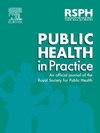The Financialization of Healthcare in France: Trends and implications
IF 1.9
Q2 PUBLIC, ENVIRONMENTAL & OCCUPATIONAL HEALTH
引用次数: 0
Abstract
The healthcare system in France, once celebrated for its universal coverage and accessibility, now grapples with profound transformations driven by corporatization, polarization, and financialization. Initially founded on principles of solidarity and government support, the system provided ample opportunities for doctors to practice either in public hospitals or private settings, with fees regulated to ensure affordability. However, recent decades have seen a shift towards agreements that allow specialists to charge additional fees beyond standard rates, which are covered by private insurance or paid directly by patients. The landscape is further complicated by demographic shifts such as an aging population and rising incidences of chronic diseases, exacerbating healthcare demand while the supply of medical professionals stagnates. Urbanization has concentrated medical services, leading to dominant practices in certain specialties and longer waiting times, especially in rural areas. Financialization has emerged as a pivotal force, with private investors increasingly influencing healthcare delivery. This trend is evident in sectors like medical biology and radiology, where consolidation and profit maximization strategies may prevail, potentially compromising care quality and access. While financial influx may temporarily address funding gaps, it also risks eroding professional autonomy and patient care standards. These developments mark a schism from traditional values of the French healthcare as a public good, raising concerns about equity, regulation, and the ethical implications of intertwining medical practice with financial imperatives in France.
法国医疗保健的金融化:趋势和影响
法国的医疗保健系统曾经以其全民覆盖和可及性而闻名,但现在却面临着公司化、两极分化和金融化推动的深刻变革。该系统最初建立在团结和政府支持的原则基础上,为医生在公立医院或私立医院执业提供了充足的机会,并对费用进行了监管,以确保他们负担得起。然而,近几十年来,已经出现了一种转变,即允许专家收取超出标准费率的额外费用,这些费用由私人保险支付或由患者直接支付。人口老龄化和慢性病发病率上升等人口结构变化使情况进一步复杂化,加剧了医疗保健需求,而医疗专业人员的供应却停滞不前。城市化集中了医疗服务,导致某些专业的做法占主导地位,等待时间更长,特别是在农村地区。金融化已成为一股关键力量,私人投资者对医疗保健服务的影响越来越大。这一趋势在医学生物学和放射学等领域很明显,在这些领域,合并和利润最大化战略可能占上风,可能会损害护理质量和获取机会。虽然资金流入可能暂时解决资金缺口,但它也有可能侵蚀专业自主权和患者护理标准。这些发展标志着法国医疗保健作为一种公共产品的传统价值观的分裂,引起了对法国医疗实践与金融需求交织在一起的公平、监管和伦理影响的关注。
本文章由计算机程序翻译,如有差异,请以英文原文为准。
求助全文
约1分钟内获得全文
求助全文

 求助内容:
求助内容: 应助结果提醒方式:
应助结果提醒方式:


